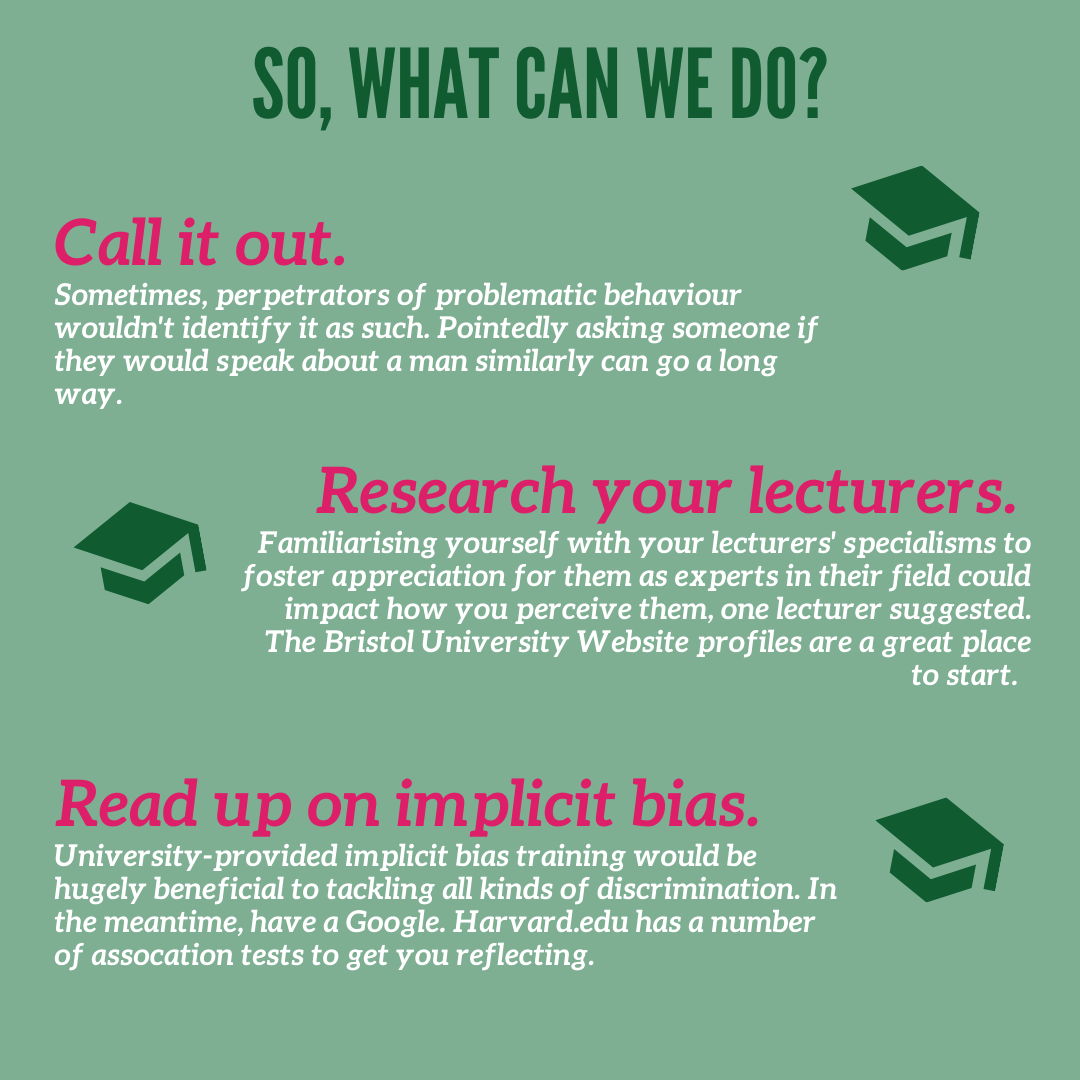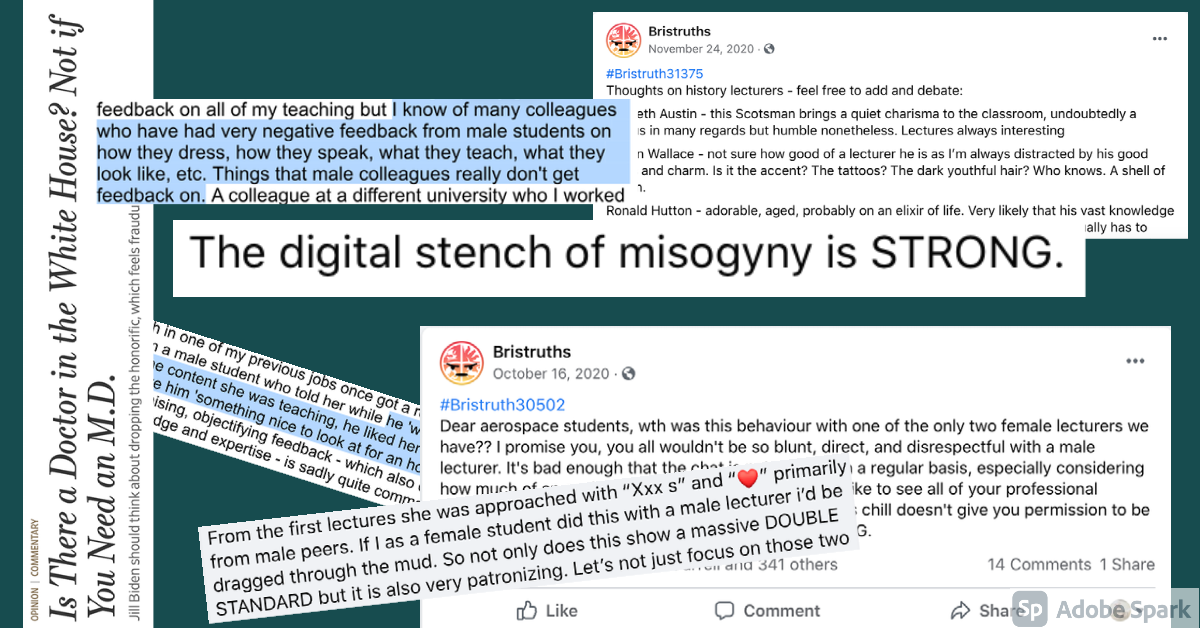By Freya Scott Turner, Deputy Editor of The Croft
Sometimes funny, sometimes petty, Bristruths the anonymous Facebook forum has oft proved itself to be a unique barometer of student opinion. But where it strays from its usual, light-hearted content - the divisive milk top debates for instance - it can reveal problematic attitudes in the student community that need to be addressed.
One recent, and lengthy, post set out to provide a cursory evaluation of various History lecturers. As well as maligning many beloved members of the department in the manner of someone clearly still hankering for the juvenile toxicity of ask.fm, it all but erased women from its assessments, tacking one female lecturer on the end as an apparent afterthought.
Another post, back in October, vented frustration at the ‘blunt, direct and disrespectful’ treatment of one of only a small handful of female Aerospace Engineering lecturers at the University, when she encountered technical difficulties during a lecture on Blackboard Collaborate. Beyond this, a student commented that this lecturer had been on the receiving end of ‘patronising’ messages of the ‘xxx’ and ‘<3’ variety throughout the term.
While the furore in the comment section of both posts suggests their authors are not representative of the student body in general, the marginalisation of and condescension towards female staff they point towards is highly concerning. It begs the question, is there a culture of casual sexism within the student community?
Epigram reached out to female members of staff at the University of Bristol and heard back from many willing to share their experiences.
‘I’m not sure I’ve ever met any female academics who haven’t experienced some form of sexism from students, to be honest’ opened the first of numerous responses that were fairly damning in the patterns of behaviour that they illuminated.
A seemingly small but revealing affront that came up repeatedly was mistitling. Many described being referred to as ‘Miss’, rather than the appropriate ‘Dr.’ or ‘Professor.’ A lecturer corroborated that ‘having spoken to some of my male colleagues about this, they report that it is rare for them to be referred to as ‘Mr’ when students address them in a formal capacity.’
But what’s in a name? ‘It can feel like a fundamental lack of recognition and respect’ another lecturer explained. The recent media hubbub over the Wall Street Journal op-ed urging ‘kiddo’ Dr. Jill Biden to drop her title shows us how the deliberate downplaying of female academic achievement is still a frequently deployed tactic to denigrate women. Mistitling our lecturers, while often an unconscious slip of the tongue, nevertheless feeds into this tendency to overlook the contributions of women to academia.
‘I’m not sure I’ve ever met any female academics who haven’t experienced some form of sexism from students, to be honest’
It is also symptomatic of a wider deference shown to male members of staff within the university. Students ‘will often ask a lower ranked male member of academic staff (a PhD student or a teaching assistant for example) for guidance, but will ignore suggestions and advice from female staff members who are more senior or experienced’, a lecturer told Epigram.
If staff perceive subtle gendering in their direct interactions with students, is this heightened with the cover of anonymity? It seems it is. Since ‘most students have enough awareness not to do things in person’ argued another lecturer, ‘I think it’s probably not in the face-to-face interactions that the most damage is done.’
In this regard, teaching and unit evaluations seem a particularly popular vehicle for the perpetuation of casual sexism. A member of staff told Epigram, ‘I know of many colleagues who have had very negative feedback from male students on how they dress, how they speak, what they teach, what they look like… things that male colleagues don’t get feedback on.’ She recalled a colleague at a previous university position had been told by a student that ‘while he ‘wasn’t convinced’ by the content she was teaching, he liked her classes because it gave him ‘something nice to look at for an hour.’ Tempted as we may be to write off this behaviour as abnormal, she explained that ‘this kind of patronising, objectifying feedback… is sadly quite common.’
‘I know of many colleagues who have had very negative feedback from male students on how they dress, how they speak, what they teach, what they look like…’
Some studies have looked into this issue more systematically. MacNell et al. (2015) observed online courses where the gender identity of the instructor was switched half-way through the term while the course remained the exact same. They found that, regardless of their actual identity, the male persona was consistently evaluated more positively. Further, a 2018 study by Mitchell et al. found that students assessed their male and female educators with different criteria, women being subject to scrutiny of their appearance and personality that men were generally spared.
These implicit biases have very concrete ramifications. Many institutions use teaching evaluations when making decisions about promotions or tenure, so this discrepancy therefore feeds into structural inequalities like the gender pay gap. At the University of Bristol, the mean gender pay gap stood at 18.6 percent as of March 2019.
While the University of Bristol does not use teaching evaluations in a formal sense, these gendered appraisals can have more covert implications. Lecturer confidence may be impacted, for instance. In an attempt to counter negative evaluations, many may also redeploy research time into teaching preparation. Such a move can be career-damaging in the current climate of casualisation which is placing increasing pressure on academics to quantitatively evidence their research output.

Sociologists have long acknowledged the double workload faced by many working mothers managing both their profession and the brunt of domestic tasks. Despite universities’ reputations as progressive cultural centres, a traditional understanding of gender roles still seems to inform student expectations of staff.
This is particularly apparent with regards to pastoral care. Many lecturers reported being frequently approached with personal problems by students who were not their personal tutees. As one explained, ‘women are often assumed to be nurturing and caring… students sometimes prefer to seek support from female members of staff.’ She added that while ‘it is important that students seek support when they need it’, ‘these ‘hidden hours’ of work are rarely accounted for in any formal capacity, and thus become an additional burden on female staff.’
If all these elements coalesce to make the job of a woman in academia that bit harder, the problems are only compounded for lecturers of colour, who have to contend with the intersecting structural disadvantages of a gender pay gap and an ethnic one (8.6 per cent as of 2019 at the University of Bristol).
Free to disagree? Bristol students tell all on controversial free speech youth organisation
The fight to feed Bristol's school children
So why don’t lecturers speak up? ‘It feels difficult to talk about with students’, one lecturer confessed, ‘as individuals we don’t want to walk around complaining.’ Perhaps they worry that the small-scale of these incidents means they will be ignored. Yet for many lecturers they are serious. As one concluded, ‘it’s a daily attack on your self-esteem’. Tellingly, all the women Epigram spoke to felt more comfortable remaining unnamed. Students are meant to be vanguards of progress, so why should the onus fall on staff to correct behaviour?
When approached for comment, a University of Bristol spokesperson said: ‘We’re hugely disappointed to hear about this unacceptable behaviour and what can only be described as outdated attitudes. There is no place for sexism or any other type of discrimination at the University of Bristol and any such behaviour will be dealt with swiftly through the appropriate channels.’
‘We would encourage any employees who have experienced or witnessed sexist behaviour to contact their line manager or a member of the HR team as soon as possible so that we can investigate it further and offer support as necessary.’
It should be said that most lecturers were keen to convey their love of teaching and the majority of their students. Still, any discrimination against staff is intolerable. Society is a long way from purging itself of misogyny, but that doesn’t mean that changing our behaviour is futile, in fact quite the opposite. As members of both the student and wider community, we all need to do better.
Have you noticed casual sexism in University of Bristol student culture?
Featured Image: Epigram / Freya Scott-Turner








